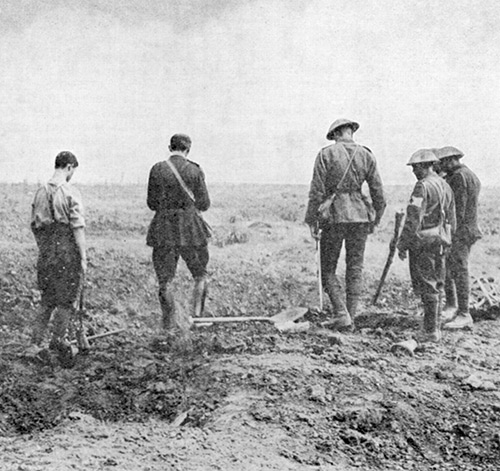Wilfred Owen, poet and soldier
 'My subject is war, and the pity of war. The poetry is in the pity.'
'My subject is war, and the pity of war. The poetry is in the pity.'
An English poet and soldier, Owen depicted more graphically and effectively than any poet before him the horrors and realities of fighting in the trenches. His poignant verse has made him one of the greatest voices to emerge from World War 1.
Born in March 1893 in Oswestry, Shropshire, Owen was one of four children of Tom and Susan, who were of Welsh ancestry. The death of Owen's grandfather led the family to move to Birkenhead, and then Shrewsbury. As a child, Owen was shy and intense, and a devout Anglican, and was deeply attached to his mother throughout his life.
From 1912, he worked as a private tutor at the Berlitz School of Languages in Bordeaux, France. Owen felt no urgency to enlist when war broke out, but he returned to England soon after, perhaps pressured by propaganda from British newspapers sent to him by his mother.
In October 1915, Owen enlisted in the Artists' Rifles Officers' Training Corps (originally in 3/28th London Regiment), becoming second lieutenant in the Manchester Regiment in 1916 (Gazette issue 29617).
Having been sent to France at the end of 1916, he was soon to suffer a succession of traumatic events, which were to change his outlook on war – not to become a pacifist, but to feel it his duty to expose the horrors of the experiences of his fellow soldiers.
After days of wading through trenches, gas attacks, attempting to sleep near to a heavy gun, and enduring the horrific stench of dead men, Owen fell into a shell hole and suffered concussion. He was blown high into the air by a trench mortar, and spent several days lying out on an embankment in Savy Wood.
Owen was sent to recuperate and be treated at Craiglockhart War Hospital, Edinburgh, where he was diagnosed with shell shock. His doctor encouraged him to write down his experiences and dreams of his time on the Western Front. He also met fellow poet and lifelong friend and mentor Siegfried Sassoon MC (Gazette issue 29684) there, an encounter that was to transform Owen's life (and his poetry).
While in hospital, Owen wrote some of his best-known poems, such as Dulce Et Decorum Est, in which he describes a gas attack and stark realities of trench life, 'Bent double, like old beggars under sacks / Knock-kneed, coughing like hags, we cursed through sludge'.
In July 1918, Owen returned to active service in France, despite his friend Sassoon’s entreaty for him not to. Perhaps Owen felt it was his duty to continue to tell the horrors of war, as well as express his own traumatic experiences, and in this was a certain amount of self-sacrifice.
The powerful poem, Spring Offensive (1918), describes the terrifying sensation of going over the top, 'And instantly the whole sky burned / With fury against them; and soft sudden cups / Opened in thousands for their blood; and the green slopes / Chasmed and steepened sheer to infinite space'.
Owen returned to the front line in August, and in October, led units of the Second Manchesters to storm a number of enemy strong points near the village of Joncourt. For his courage and leadership, when he seized a German machine gun and used it to kill a number of the enemy, he was awarded the Military Cross (Gazette issue 2378).
The citation followed on 30 July 1919, Gazette issue 31480:
'2nd Lt, Wilfred Edward Salter Owen, 5th Bn. Manch. R., T.F., attd. 2nd Bn.
'For conspicuous gallantry and devotion to duty in the attack on the Fonsomme Line on October 1st/2nd, 1918. On the company commander becoming a casualty, he assumed command and showed fine leadership and resisted a heavy counter-attack. He personally manipulated a captured enemy machine gun from an isolated position and inflicted considerable losses on the enemy. Throughout he behaved most gallantly.'
Exactly a week before the Armistice was signed, on 4 November 1918, Owen, aged just 25, was killed in action near the village of Ors, while attempting to lead his men across the Sambre-Oise Canal. His mother was informed of the death of her son by telegram on 11 November.
See all World War 1 notices in The Gazette.
